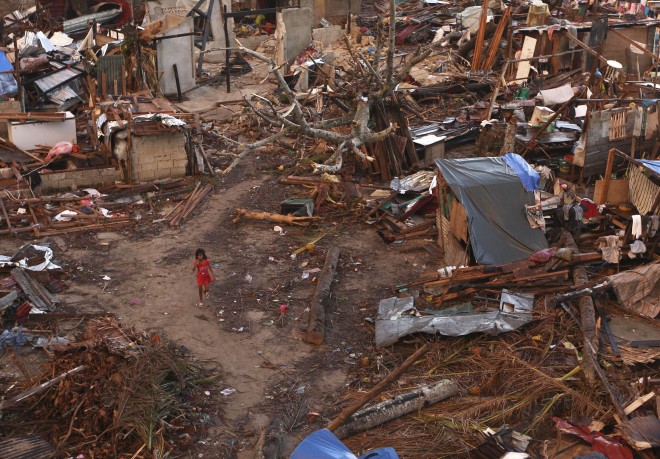5,000 families in Samar need livelihood aid

A young girl walks amid ruins of houses in a neighborhood badly affected by Supertyphoon “Yolanda” (Haiyan) in Guiuan, Samar, on Nov. 15, 2013. More than 5,000 families of fishermen, livestock and cattle raisers and farmers are in need of immediate livelihood assistance in Guiuan, according to the latest report from the Office of Civil Defense of Eastern Visayas. AP PHOTO/DITA ALANGKARA
TACLOBAN CITY, Philippines—More than 5,000 families of fishermen, livestock and cattle raisers and farmers are in need of immediate livelihood assistance in Guiuan town, Samar province, according to the latest report from the Office of Civil Defense of Eastern Visayas (OCD 8).
This figure, collated by the OCD, was released on Sunday to further clarify the course by which the government’s rehabilitation plan would take for the livelihood of people affected by the typhoon, said Ben Linde of OCD 8.
Some 595 of these affected families were involved in rice and coconut farming, another 404 raised livestock for a living and 529 were raising cattle before Supertyphoon “Yolanda” struck.
The families who were involved in various methods of fishing and seaweed farming numbered 3,333, the OCD report stated.
In an interview on Saturday, UN spokesperson in Tacloban City Gemma Cortes said the government and all other humanitarian organizations involved in the rehabilitation of Yolanda-affected areas in the Philippines should focus most on helping families involved in agriculture and fisheries.
Article continues after this advertisementShe said this was because about 90 percent of households in the places that Yolanda devastated were involved in trade and industries directly related to agriculture.
Article continues after this advertisementOn Dec. 14, Europe-based organization Oxfam (formerly Oxford Committee for Famine Relief) started distributing palay grains to farmers in Tanauan town, Leyte province.
Ian Bray, Oxfam media officer, said there were 1,004 sacks of palay, each weighing 80 kilograms, that were divided among the farmers in Tanauan.
Other municipalities like Palo, Mayorga, Dulac, MacArthur and Julieta will also receive palay seeds but Oxfam chose to start with Tanauan with 15 of its barangays (villages) because it is mainly an agricultural town.
Bray said they saw the distribution of seeds as an urgent action because the farmers have to catch up with this season’s planting period and harvest time.
“They have to get the seeds on the soil so that they will have something (income) for next year,” he said.